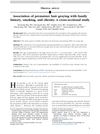 10 citations,
January 2008 in “Acta dermato-venereologica”
10 citations,
January 2008 in “Acta dermato-venereologica” Carbamazepine caused hair loss and skin eruptions in a woman, which improved after stopping the medication.
 26 citations,
May 2019 in “PLOS ONE”
26 citations,
May 2019 in “PLOS ONE” Hair loss patients have different microbes in hair follicles, possibly affecting hair loss.

Minoxidil cream can safely treat hair loss in kids with ectodermal dysplasia.
 16 citations,
December 2018 in “ACS Biomaterials Science & Engineering”
16 citations,
December 2018 in “ACS Biomaterials Science & Engineering” The new patch made of cell matrix and a polymer improves wound healing and supports blood vessel growth.
 10 citations,
November 2012 in “The journal of investigative dermatology/Journal of investigative dermatology”
10 citations,
November 2012 in “The journal of investigative dermatology/Journal of investigative dermatology” Korean and Caucasian men with male pattern baldness have different hair steroid levels.
 22 citations,
February 2002 in “Planta Medica”
22 citations,
February 2002 in “Planta Medica” Compounds from Angelica koreana roots, especially osthenol, could be effective for treating conditions like prostate disease and hair loss.
 April 2022 in “Biomedicine & Pharmacotherapy”
April 2022 in “Biomedicine & Pharmacotherapy” CXCL12 protein slows down hair growth through its receptor CXCR4. Blocking this can potentially increase hair growth.
 April 2016 in “Journal of Investigative Dermatology”
April 2016 in “Journal of Investigative Dermatology” Gypenosides from Gynostemma pentaphyllum were found to have anti-aging effects, increasing skin collagen and reducing wrinkles.
 September 2017 in “Asian Journal of Beauty and Cosmetology”
September 2017 in “Asian Journal of Beauty and Cosmetology” The Notch signaling pathway is important for hair follicle development and could help create treatments for hair disorders.
 July 2023 in “Current Issues in Molecular Biology”
July 2023 in “Current Issues in Molecular Biology” Escin may help treat hair loss by boosting a specific cell growth pathway.
 2 citations,
March 2016 in “The Journal of Dermatology”
2 citations,
March 2016 in “The Journal of Dermatology” The Facial Psoriasis Log-based Area and Severity Index is a more effective way to measure improvements in facial psoriasis than the traditional method.
 8 citations,
November 2015 in “Saudi Journal of Biological Sciences”
8 citations,
November 2015 in “Saudi Journal of Biological Sciences” A mix of Panax ginseng and bee-pollen may help prevent prostate enlargement in rats.
January 2012 in “프로그램북(구 초록집)” 16 citations,
January 2013 in “Pediatric Gastroenterology Hepatology & Nutrition” Azathioprine caused side effects in over half of the Korean pediatric inflammatory bowel disease patients, requiring close monitoring.
 4 citations,
December 2022 in “International Journal of Molecular Sciences”
4 citations,
December 2022 in “International Journal of Molecular Sciences” Zinc is crucial for skin health and treating various skin disorders.
 7 citations,
December 2020 in “Pharmaceutics”
7 citations,
December 2020 in “Pharmaceutics” A mix of tocopherol acetate and L-menthol helps grow hair better than using them separately or using minoxidil.
 8 citations,
January 2016 in “Annals of Dermatology”
8 citations,
January 2016 in “Annals of Dermatology” A complex of 5-aminolevulinic acid and glycyl-histidyl-lysine peptide may help increase hair count in male pattern hair loss without side effects.
 13 citations,
September 2021 in “Current Issues in Molecular Biology”
13 citations,
September 2021 in “Current Issues in Molecular Biology” Dexpanthenol helps human hair follicle cells grow by preventing aging and death, and by supporting growth signals.

Eriocitrin and silymarin might be effective for hair loss treatment and need more research.
 10 citations,
April 2019 in “Journal of Analytical Science and Technology”
10 citations,
April 2019 in “Journal of Analytical Science and Technology” Lactobacillus plantarum hydrolysates may help increase hair growth by boosting VEGF production.
 1 citations,
October 2021 in “Clinical, Cosmetic and Investigational Dermatology”
1 citations,
October 2021 in “Clinical, Cosmetic and Investigational Dermatology” Vitamin B3 may help prevent hair loss and promote hair growth by protecting scalp cells from stress and reducing hair growth-blocking proteins.
 1 citations,
June 2022 in “Journal of Plastic Reconstructive and Aesthetic Surgery”
1 citations,
June 2022 in “Journal of Plastic Reconstructive and Aesthetic Surgery” Hair restoration surgeons have a 15% yearly risk of being sued, and while they often win, the process is stressful and costly.
 8 citations,
October 2018 in “Journal of Investigative Dermatology”
8 citations,
October 2018 in “Journal of Investigative Dermatology” Many patients with Alopecia Areata in Korea experience anxiety, depression, and reduced quality of life, which are often unrelated to the severity of hair loss.
 4 citations,
June 2018 in “PLOS ONE”
4 citations,
June 2018 in “PLOS ONE” Iron levels are linked to insulin resistance in men and postmenopausal women, but not in premenopausal women.
 46 citations,
December 2014 in “Journal of The American Academy of Dermatology”
46 citations,
December 2014 in “Journal of The American Academy of Dermatology” Premature hair graying in young men is linked to family history, obesity, and smoking.
 November 2024 in “Skin Appendage Disorders”
November 2024 in “Skin Appendage Disorders” Start low-dose minoxidil gradually, especially for women, to reduce side effects.
 December 2024 in “Medical Review”
December 2024 in “Medical Review” Organoids help study and treat genetic diseases, offering personalized medicine and therapy testing.
 101 citations,
January 2012 in “Annals of Dermatology”
101 citations,
January 2012 in “Annals of Dermatology” Men with hair loss experience lower quality of life, worsened by factors like age, severity, and treatment history.
 1 citations,
January 2022 in “Journal of Cutaneous Medicine and Surgery”
1 citations,
January 2022 in “Journal of Cutaneous Medicine and Surgery” Poor nutrition is linked to increased hair loss in Canadian children.
 June 2024 in “International journal of molecular sciences”
June 2024 in “International journal of molecular sciences” Adenosine complex helps increase hair thickness and density in hair loss.




























